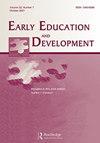Narrowing the Digital Divide in Early Maths: How Different Modes of Assessment Influence Young Children’s Mathematical Test Scores
IF 2.2
3区 教育学
Q1 EDUCATION & EDUCATIONAL RESEARCH
引用次数: 0
Abstract
Research Findings: Children are increasingly using touchscreen technologies at home, which has become a recurring feature within their classroom too. Research has investigated the potential effect of using computer-based tests to assess pupils’ performance rather than traditional paper tests. An agreement has still not been formed about the impact of the mode of assessment on pupils’ mathematical test scores. A mixed methods design was employed to explore the impact of the testing on young children’s mathematical test scores. Thirty-seven children 4-7-years old were recruited from a primary school in England with their parents. A mathematical test on paper and an iPad was administered to each participant which was accompanied by an interview. Data regarding the use of touchscreens at home were explored with an on-line parental questionnaire. The results showed that gender and test type impact mathematical test scores, with females performing the best on the iPad test. The findings also suggested that as tablet usage increased at home, iPad mathematical test scores decreased. The interviews revealed that children rely on different strategies when resolving mathematical problems. Practice or Policy: Digital testing may enable a better investigation of mathematical skills in the first years of schooling and of differences between males and females’ responses to solving mathematical questions, which then could be used to tailor the curriculum.缩小早期数学的数字鸿沟:不同的评估模式如何影响幼儿数学考试成绩
研究发现:孩子们越来越多地在家里使用触摸屏技术,这在他们的课堂上也已经成为一个反复出现的特征。研究已经调查了使用基于计算机的测试来评估学生表现而不是传统的纸面测试的潜在影响。关于这种评估模式对学生数学考试成绩的影响,目前还没有达成一致意见。采用混合方法设计探讨测试对幼儿数学测试成绩的影响。研究人员从英国的一所小学招募了37名4-7岁的孩子,他们的父母在一起。每位参与者在纸上和iPad上进行数学测试,并接受采访。通过一份在线父母问卷调查了关于在家中使用触摸屏的数据。结果显示,性别和测试类型会影响数学测试成绩,女性在iPad测试中表现最好。研究结果还表明,随着在家使用平板电脑的增加,iPad的数学测试成绩下降。访谈显示,孩子们在解决数学问题时依赖不同的策略。实践还是政策:数字测试可以更好地调查学生入学头几年的数学技能,以及男女在解决数学问题时的反应差异,然后可以用来调整课程。
本文章由计算机程序翻译,如有差异,请以英文原文为准。
求助全文
约1分钟内获得全文
求助全文
来源期刊

Early Education and Development
Multiple-
CiteScore
5.50
自引率
10.30%
发文量
78
期刊介绍:
Early Education and Development (EE&D) is a professional journal for those involved in educational and preschool services and research related to children and their families: early education supervisors, school psychologists, daycare administrators, child development specialists, developmental and child clinical psychologists, and special education administrators. It is designed to emphasize the implications for practice of research and solid scientific information. The age range focused upon is preschool through the primary grades. EE&D is a connecting link between the research community in early education and child development and school district early education programs, daycare systems, and special needs preschool programs.
 求助内容:
求助内容: 应助结果提醒方式:
应助结果提醒方式:


